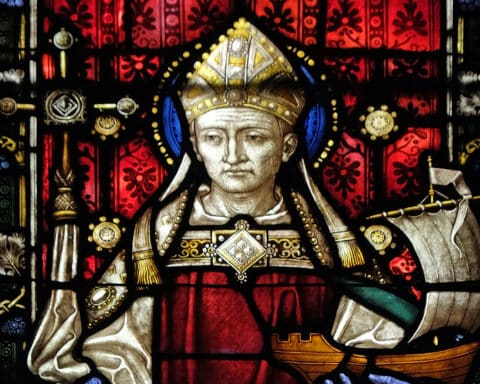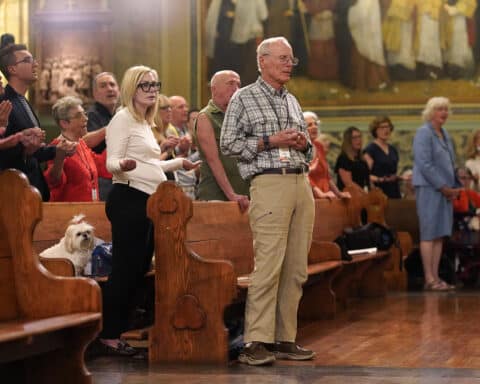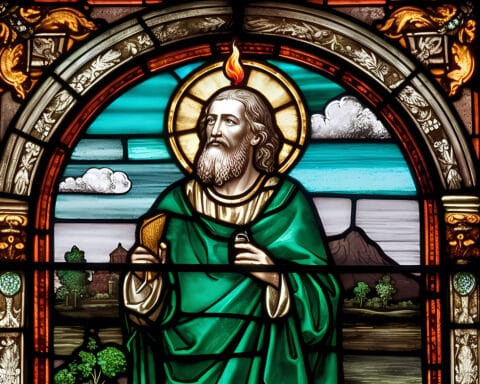Bartolomé de Las Casas was a slaveholding priest. Worse, he was a priest who went on raids into Indigenous villages to capture slaves. And though he eventually revised his stance on the enslavement of Indigenous peoples, he continued to support Black slavery.
He’s on the path to sainthood.
How?
Because that wasn’t the end of his story.
His racial violence wasn’t the end. His continued racism wasn’t the end. Bartolomé de Las Casas, above all, was a man capable of confronting his own sinfulness and being converted. It happened gradually, it happened at great cost, but it happened. And someday soon, he may be raised to the altars, not because he was always a good man, but because he wasn’t afraid of recognizing what was evil in him and doing the work (with God’s grace) to root it out.
Slave owner
Born in Spain in the late 15th century, Las Casas sailed for Hispaniola (now Haiti) when he was 18, where he became a slave owner and participated in violent raids to kidnap and enslave native peoples. In 1510, he was ordained a priest (the first priest ordained in the New World). Still, he saw no problem in continuing to exploit enslaved peoples on his encomienda (a sort of feudal plantation).
But when Dominican friars arrived on the island, they denied absolution to all slaveholders. Las Casas was as enraged as the others by what seemed an appalling overreach, but the Dominicans refused to bow to political pressure. On Christmas Eve, Fray Antonio de Montesinos preached passionately against slavery and racism, shouting, “You are in mortal sin, and live and die therein by reason of the cruelty and tyranny that you practice on these innocent people.”
Las Casas fought back, appealing to the crown. The Dominicans were recalled from Hispaniola, and the colonizers continued to enslave native people. Las Casas managed to compartmentalize his life as a colonizer (including witnessing horrific violence in the conquest of Cuba) all while continuing to serve as a priest. Some years later, he was able to process the violence he had witnessed, writing, “I saw here cruelty on a scale no living being has ever seen or expects to see.”
Change in conscience
But the seed had been planted. In 1514, while preparing for a Pentecost sermon, Las Casas read Sirach 34:18-22: “He sheds blood who denies the laborer his wages.” Finally, his conscience spoke louder than his culture. He became thoroughly convinced of the humanity of native people, renounced his claim to the Indigenous serfs on his encomienda and sailed for Spain to advocate against the enslavement of Indigenous people. He traveled in the company of de Montesinos, the same friar whose abolitionist homily had so enraged Las Casas only a few years earlier.
Las Casas was named “Protector of the Indians” and sent back across the Atlantic to attempt reforms, but he was resisted by slaveholders and by other clergy who thought him too idealistic. Hated by all, he sought refuge with the Dominican order, which he entered. As a Dominican friar, he continued to advocate for the rights of Indigenous people, particularly their right not to be forcibly converted. He wrote extensive histories detailing the abuses wrought by Spaniards in the New World; one volume was so shocking that it convinced the king of Spain to enact a group of laws called the New Laws, which ended Indigenous slavery in the New World and limited the encomienda system to one generation.
The encomenderos were enraged, as were all slave-owning Spaniards. But worse was still to come for them. When Las Casas was appointed bishop of Chiapas, Mexico, he enacted a policy in his diocese that denied sacramental absolution to slave owners and encomenderos even on their deathbeds unless they freed all their slaves. The people were livid, and when political pressure led to the repeal of the New Laws, colonists celebrated with riots (during which Bishop de Las Casas was shot at by his people). After 18 months as bishop, Las Casas left Chiapas for Mexico City in early 1546. Within another year he abandoned all hope of returning to his see, appointed a vicar, and made his way back to Spain.
Guilty of ignorance
All this time, Las Casas continued to support Black slavery and even owned four Black slaves himself; he was convinced that Africans were hardier than Indigenous people (when, in fact, they were just immune to the European diseases that devastated the Native Americans). He was also misinformed about the provenance of these enslaved people, having been told that they had been captured in just wars, not kidnapped and sold. More than anything, he wasn’t yet convinced that slavery was a crime against humanity. But Las Casas had learned to listen to the cry of the oppressed, and some time after his return to Spain, he realized the dignity of Black people as well. He wrote: “I soon repented and judged myself guilty of ignorance. I came to realize that Black slavery was as unjust as Indian slavery … and I was not sure that my ignorance and good faith would secure me in the eyes of God.”
Fighting racism and exploitation
Las Casas then proceeded to spend the rest of his life in Europe, fighting against all racism and exploitation. He wrote scathing histories of the Spanish conquest and was repeatedly accused of exaggeration, treason and even heresy. But he was so convinced of the injustice of the Spanish position that such opposition didn’t silence him. He wrote a book describing the many atrocities committed by the Spaniards and left instructions for it to be published after his death, “so that, if God determines to destroy Spain, it may be seen that it is because of the destruction that we have wrought in the Indies and his just reason for it may be clearly evident.” He later chose to publish the work, deciding that the truth must be known, whatever the consequences might be.
Las Casas argued not only against slavery but also against conquest, insisting that Indigenous Americans weren’t the uncivilized savages they were made out to be. When others argued that Spanish rule was necessary to protect weaker communities from stronger ones, he asserted that it was better for the weaker Indigenous to suffer at the hands of the stronger, rather than all Indigenous people suffering at the hands of Spain. Though Las Casas longed for the conversion of the Americas, he knew that it could only truly happen through genuine evangelization, not conquest and forced conversion.
These were dangerous ideas. Las Casas was denounced to the Inquisition. His writings were occasionally burned. He was hated in life and maligned for centuries after his death, considered a traitor because he challenged the racism of his country.
Witness
Las Casas is an incredible witness not because he was a savior to Black and Brown people but because he did the hard work of reflecting on his own prejudice and privilege and changing his behavior, even when it caused great shame, cost him dearly or required a lifetime of work.
During this time of turmoil and division, Servant of God Bartolomé de Las Casas stands as a powerful intercessor for those who are actively racist, who enact or advocate for oppressive laws and systems. But he is also a convicting witness to those of us who would never utter a racial slur or refuse to hire a person of color, but still might harbor prejudices or refuse to stand on behalf of marginalized people. Can we, like Las Casas, engage in honest self-reflection, examining our prejudices and refusing to justify them? Can we do the hard work of fighting for justice, even if it puts us at odds with those we love?
God, make us more like Bartolomé de Las Casas.
Meg Hunter-Kilmer is a Catholic author and speaker. Visit her website at piercedhands.com.





